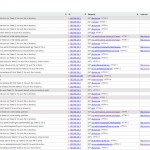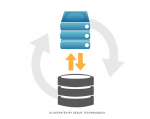Check Configuring iptables on CentOS post.
Why should you do that while APF or CSF can do it automatically?
Because APF/CSF could block an important bot testing your server to add to search index. So reviewing every ip would be a daily task!
Ok, so how?
using RHEL4, centos4
#vi /etc/init.d/iptables
go to 'start() {'
#insert these lines before 'touch $VAR_SUBSYS_IPTABLES'
#banning BAD IPS
if [ -f /var/badips ]
then
for BAD_IP in `cat /var/badips`
do
iptables -I INPUT -s $BAD_IP -j DROP
echo 'ip '$BAD_IP' banned'
echo
done
else
echo "Can't read /var/badips"
fi
#echo '80.145.203.224' >> /var/badip
/etc/init.d/iptables restart
Ok but how about a nice PHP script which would do that without getting into ssh?
$file = '/var/badips';
#remove IP use ?do=rm&ip=80.145.203.224
$arr = array_map('rtrim',file($file));
if($_GET['do']=='rm'){
unset($arr[array_search($_GET['ip'],$arr)]);
if(file_put_contents($file,implode("\n",$arr)))
echo $_GET['ip'].' removed';
}else{ #add ip ?ip=80.145.203.224
#duplicated ip
if(is_array($arr) && in_array($_GET['ip'],$arr)) echo $_GET['ip'].' exits';
else{
exec("/sbin/iptables -I INPUT -s {$_GET['ip']} -j DROP");
exec("/etc/init.d/iptables restart",$output);
if(file_put_contents($file,"{$_GET['ip']}\n",FILE_APPEND))
echo $_GET['ip'].' Banned';
}
exec("cat {$file}",$output);
}
print_r($output);
add the script to file ban.php and make sure file ‘badips’ is 666 writable then excute ban.php?ip=80.145.203.224 to ban this ip or ban.php?ip=80.145.203.224&do=rm to remove it from the banned ips
















